Aftermovie

The TETRA-project REjuveBIT started in November 2018 and is a collaboration between the university of Antwerp and the Belgian Road Research centre.
The overall aim of the project is to assess the application of rejuvenating agents in the asphalt sector so that their innovative use leads to an increase in the recycling percentage of reclaimed asphalt. This assessment includes a technical, economic and environmental part. The innovative character is demonstrated for the sector by means of test tracks with new applications (surface courses) and increased recycling percentages (base courses).
To conclude the project, a study day was organized on January 28th, 2021. You can find the presentation of the study day here.
Detailed project description
Reclaimed asphalt is re-used in the production cycle of asphalt, mainly in mixtures for base layers. With an average rate of 66% reuse, there is still a last step required to optimize reuse and/or new applications, for example use in surface layers. Rejuvebit will investigate the technical, economic and ecological impact of rejuvenation, so its use will increase a proper recycling rate of asphalt granulate. The review and market survey of the rejuvenation supply resources, lead to a ranking of potential rejuvenators for the Flemish asphalt sector. On the basis of 5 demonstrative test subjects in Flanders the technical impact of the use of rejuvenators will be evaluated on the level of mixture design, mechanical properties and traceability. These demonstrations are intensively documented on the basis of a written final report, a public accessible web site and dissemination in the media. An experimental lab research leads to recommendations for the allowed deviations for production described in e.g. a tender. The project involves the quantification of the environmental impact and economic feasibility for Flanders, with scenarios for 5 typical asphalt plants in order to increase the recycling rates for all types of asphalt plants and by type of mixture. The project relates the technical quality and durability (life) and of the social sustainability (financial feasibility, ecological profile and social effects). As economic impact, a higher production of asphalt is aimed at; and more in-depth innovation studies for "greener asphalt", given the increase of the recycling (both higher percentages as new applications) will not lead to lower sales but to a higher production for the same budget of the client. In this project the direct economic impact (on the target group) is calculated for the 5 test cases (cost balance with higher recycling and extending the life cycle).The social benefit is to be found in the conservation of the road infrastructure (shown in this project by means of laboratory test results and subsequently by means the monitoring of the test tracks) and a reduced ecological footprint at a higher production volume, demonstrated in this project by means of comparative LCA studies of the 5 test cases with the main parameters: Global Warming Potential, Depletion of resources and waste management, air pollution, toxicity, recyclability, performance and service life. The quantification is too complex for each individual actor, hence the inclusion in this project. This quantification may subsequently be used by policy-makers for further environmental measures or as an example in other industries.
This project is funded by the users group and VLAIO (Flemish Government) Tetrafonds (HBC.2018.0021 RejuveBIT). Project partners: UAntwerp (RERS) and BRRC (dep.BAC)
Test track 1 - Steenlandlaan, Kallo
The first test track was paved on the 23rd of May 2019 at Steenlandlaan in Beveren. Click here for the location description.
Three top layer sections of approximately 150m were paved:
Section 1: APT-C without RA
- No rejuvenator
- Virgin bitumen 50/70
Section 2: APT-C with 40% RA
- No rejuvenator
- Virgin bitumen 50/70
Section 3: APT-C with 40% RA
- With rejuvenator
- Virgin bitumen 50/70
Partners
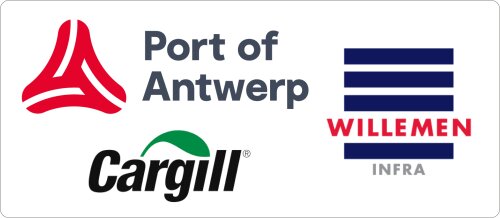
Test track 2 - N126, Retie
The second test track was paved on the 20th of May 2019 at N123 in Retie. Click here for the location description.
Three top layer sections of approximately 150m were paved:
Section 1: APT-C without RA
- No rejuvenator
Section 2: APT-C with 20% RA
- No rejuvenator
Section 3: APT-C with 40% RA
- With rejuvenator
Partners
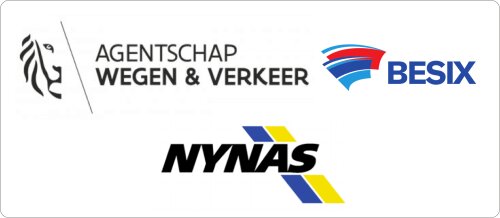
Test track 3 - Kikvorsstraat, Ghent
The third test track was paved on the 10th of October 2019 at Kikvorsstraat in Ghent. Click here for the location description.
Three top layer sections of approximately 150m were paved:
Section 1: AB-4C with 40% RA
- No rejuvenator
Section 2: AB-4C with 40% RA
- With rejuvenator
Section 3: AB-4 with 40% RA and reduced production temperature (130°C)
- With rejuvenator
Partners
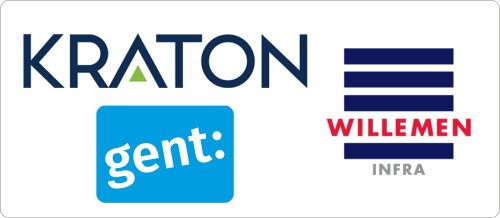
Test track 4 - Albert Giraudlaan, Schaarbeek
The fourth test track was paved on the 8th of October 2020 at Albert Giraudlaan in Schaarbeek.
Two base layer sections were paved:
Section 1: APO-B with 70% RA
- No rejuvenator
Section 2: APO-B with 70% RA
- With rejuvenator
Partners
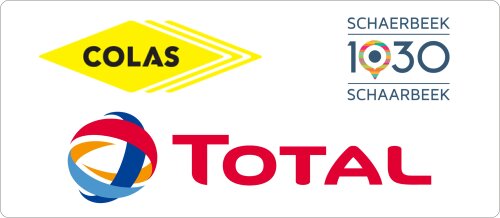
Test track 5 - Groenenborgerlaan, Wilrijk - Base layer
The fifth test track was paved on the 7th of September 2020 at Groenenborgerlaan in Wilrijk.
Two base layer sections were paved:
Section 1: APO-A with 70% RA
- No rejuvenator
Section 2: APO-A with 70% RA
- With rejuvenator and reduced production temperature
Partners
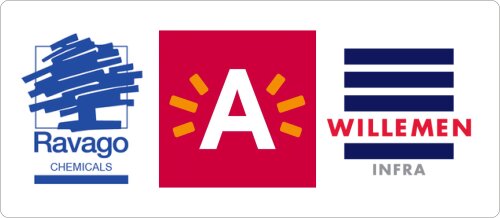
Test track 6 - Groenenborgerlaan, Wilrijk - Top layer
The sixth test track was paved on the 25th of September 2020 at Groenenborgerlaan in Wilrijk.
Two top layer sections were paved:
Section 1: SMA-C with 40% RA
- No rejuvenator
Section 2: SMA-C with 40% RA
- With rejuvenator
Partners
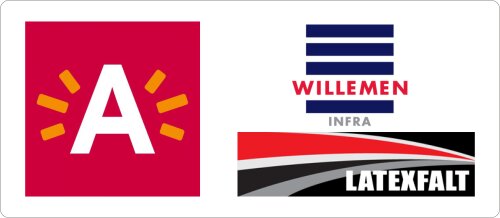
REjuveBIT in the media
- 2019/05/20: VRT Nieuws - Ecologisch asfalt
- 2019/05/20: ATV - UAntwerpen neemt deel aan project rond duurzame wegenbouw
- 2019/05/20: ATV - UAntwerpen werkt mee aan duurzame wegenbouw
- 2019/05/20: Nieuwsblad - Agentschap Wegen en Verkeer experimenteert met groen asfalt op N123
- 2019/05/20: Het Laatste Nieuws - Proefproject met groen asfalt van start
- 2019/05/20: Het Laatste Nieuws - Primeur voor Vlaanderen: Vlaamse overheid test 'groen' asfalt uit in Kasteelstraat
- 2019/05/20: GvA - 'Groenere' asfalt op gewestweg in Retie moet duurzaamheid in wegenbouw verhogen
Partners
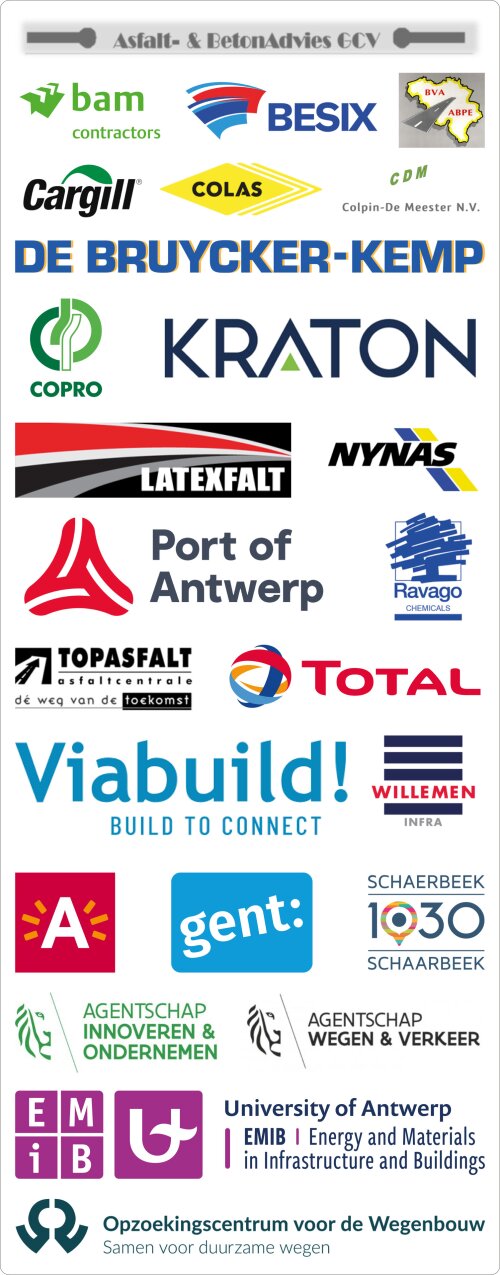
LCA
Under construction